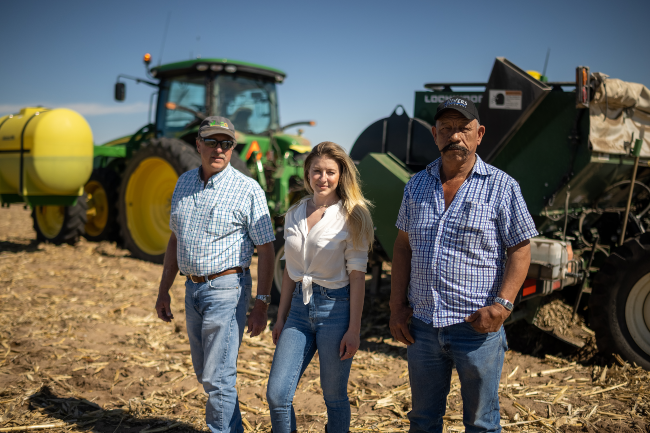
Strohauer Farms uses organic, fingerling potatoes to diversify and grow
When the other kids were riding tricycles, Harry Dean Strohauer already had his sights set on driving tractors. If he saw a chance to cut school in favor of cleaning a ditch, young Harry would have gladly taken the latter.
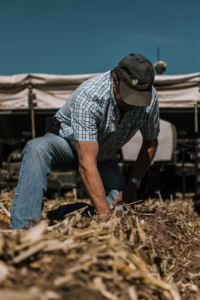
A farming lifer from the get-go, Strohauer grew up in a potato-growing family in the small Northern Colorado community of LaSalle. At just 15 years old, Harry was thrust into the role of family patriarch when his father, Harry P., died in 1975.
The Strohauer family has been farming in the Greeley area since 1910, when John Strohauer settled there after immigrating to the U.S. from Germany. John’s sons, including Harry P., continued to farm, but what Strohauer Farms is today largely evolved after his passing. Harry D. continued to partner with his Uncle John after Harry P.’s death.
“My dad so looked up to his dad. They had a special relationship, and he learned to grow potatoes from him,” said Amber Strohauer, Harry’s oldest daughter and chief operating officer. “But my dad truly had to start from scratch. We didn’t have ground or equipment or water rights.”
Strohauer Farms’ evolution over the past 46 years is a symbolic tale of 21st century American agricultural innovation that includes both conventional and organic farming and growing specialty potatoes that would have been foreign to anything Harry knew as a boy.
Changing course
Growing potatoes in the region north of Denver used to be commonplace. Strohauer Farms gradually built up its operations as a conventional potato grower over the latter portion of the 20th century and were surrounded by plenty of other like-minded potato farmers. The landscape has changed drastically during this century, however.
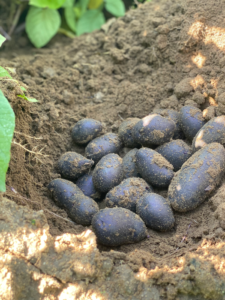
“In my lifetime, there were 60 or 70 growers around here,” Harry Strohauer said. “There are still three or four east of here, but we’re the only one left growing potatoes north of Denver.” To stress how quickly potato growing dissipated in the area, Amber added: “There were 64 potato growers in the Greeley area when I was 10 years old (approximately 20 years ago).”
Colorado is divided into two marketing districts. District 2, which includes the highly productive San Luis Valley southwest of Denver, is the predominant district today, but it wasn’t always that way. The district where Strohauer Farms is located would typically harvest earlier than the San Luis Valley and traditionally supplied fresh potatoes to retailers in late summer. Markets shifted and storage practices improved, which played a role in early-harvest potatoes not having as much demand, but the major factor that led to the decrease in potato growing north of Denver was water.
“Water played a really big issue in it,” Harry said. “We even changed locations at one point, but then, in 2012, it got so bad to get positive water, we had to do something.”
Added Amber: “That’s really why we got into the fingerlings and organic. You couldn’t grow crops in this area in mass amounts, you couldn’t really have conventional russets be viable.”
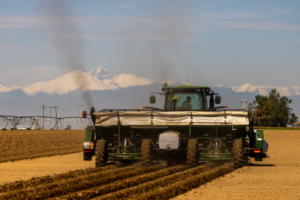
Today, Strohauer Farms grows conventional and organic potatoes — russets, reds and yukons and red, yellow and purples fingerlings. The farm previously grew onions as a cash crop, but continually had issues with hail, but still grows shallots, as well as corn, hay, wheat and triticale.
The Strohauers started experimenting with specialty potato varieties in 2006 and received early interest from Whole Foods, which wanted organically grown potatoes, but it was the water scarcity that really pushed them to diversify how they grow and what they grow.
Although they still grow more conventional potatoes than organic, they said adding organic and a lot of specialty varieties, which are grown in small plots, has helped them become better farmers.
“It’s really in our blood, at this point,” Amber said, “but we do things so much more differently than we did even 10 years ago.”
There has been a lot of trial and error with organic growing since they started 15 years ago. That continues even now, as more organically approved crop protection agents enter the market, but added that expectations for visibly pleased and perfect-sized potatoes also have gotten higher.
“I sometimes question if it gets easier, even though we have more tools in our toolbox,” said Harry. “There used to be more tolerance for misshapes or silver scurf or things like that, but I think we’re now held to a higher standard for our organics than we are for our conventional. … We sort our organics harder than we do our conventionals.”
Amber said growing public awareness of food waste, which was heightened in the early stages of the pandemic, has been helpful in that department.
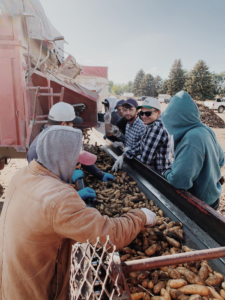
“One benefit among so many unfortunate things during this pandemic is that there has been a bigger market for No. 2 and imperfect potatoes, specifically organics, which has helped,” she said. “This year saw a huge spike in consumers being willing to go the imperfect route.”
Harry said he noticed Colorado potato beetle pressure — which had not been a problem with conventional potatoes — increased when he began growing organically. Nematodes, too, had always been an issue and continue to be, but the biggest issue with organic potatoes has been silver scurf, Harry said.
“I’ve told them (crop protection companies) to do whatever you need to do (to come up with a solution to silver scurf,” Harry said.
While insect and disease pressure remains an ongoing issue, when it comes to cover crops and organic potato rotation, the Strohauers feel pretty good about where they’re at. Due to limited organic acres, potatoes are on a tight two-year rotation, but the off year is all about soil health and cover crops, rather than using a cash crop rotation. Cover crops include hairy vetch, red clover, peas, wheat, beets, turnips and hay, among others. Harry said the rotational system has been “very successful” for them.
While demand is increasing, organic potatoes still make up only about 5% of the market — the majority of Strohauer potato acres are still conventional — but the diversity has helped the farm continue to thrive. In addition to Northern Colorado, Strohauer Farms also has acres in New Mexico and Texas.
Harry said when he runs into conventional growers, he often gets casual inquiries about how the organic side is going. Harry said he is always willing to lend his knowledge to a grower looking to experiment with organic.
“It’s brutal when you start something and you don’t know which you’re turning sometimes,” he said.
Outreach and marketing
Harry Strohauer has always been a vocal advocate for agriculture. He’s a longtime member of the National Potato Council, former president of the Colorado Onion Association and is the current chair of the Colorado Potato Administrative Committee Area III. The farm is also a member of Western Growers and the Colorado Fruit and Vegetable Association.
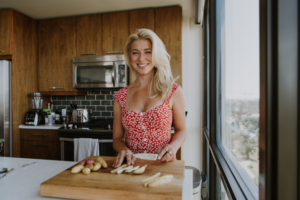
Harry is constantly being quoted in agriculture-related stories because he sees value in being a voice not only for his family’s farm, but for all of agriculture.
“We’ve always wanted to share our story,” he said. “People want to know where their food comes from and that’s only increasing. People want local, but even if it’s not local, they at least want to know where it’s coming from and who it’s coming from. We’ve tried to provide that.”
In 2015, after graduating from Vanderbilt University and working in Nashville, Amber returned to the farm full-time. Like Harry, she is passionate about making connections and sharing their story, from both marketing and advocacy standpoints.
“I love farming with my dad — he’s so passionate about it — so I think the marketing drive came from a personal place of wanting to share that passion with others,” she said.
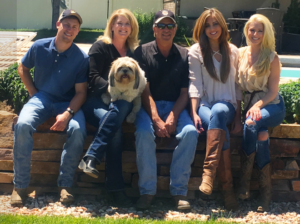
With the percentage of the population that calls agriculture a profession continuing to shrink, Amber fears the public connection with farmers will further lag without increased outreach.
“With the general public, there is this common misconception out there that farmers are destroying the soil,” she said. “The soil is our most valuable resource. It’s our legacy — it’s everything. No matter if you’re conventional or organic, soil is the passion of every farmer.”
When Amber has time to be away from the farm, sales and warehouse operations, she enjoys hanging out in the food scenes in various Colorado cities, which has led to a lot of connections with chefs. She has collaborated with numerous chefs on videos, whether at their restaurants, or by hosting them in the family’s kitchen. The Strohauer Farms website also has plenty of recipes created using the family’s produce.
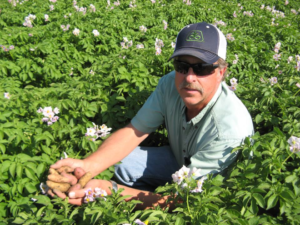
“I love working with chefs. Denver, Boulder, Fort Collins, Longmont — we have these massive chef scenes and I love hanging out with them, so probably that’s spurred some of the content ideas we’ve put out there,” Amber said. “But it does give us the opportunity to talk about where that food comes from and build that connection.”
“It can be hard to get that story out,” she added. “As farmers, I think we do struggle to communicate how we take care of our land and resources, the innovation we have going on and all the different practices we’re trying to emulate.”
Strohauer Farms is a true family operation. In addition to Harry serving as president and Amber as COO, Harry’s wife, Katie, is the chief financial officer, and their second daughter, April, is currently helping in a management role. Their youngest child, Tad, is a teacher in San Diego. They also have a dedicated staff, Amber said.
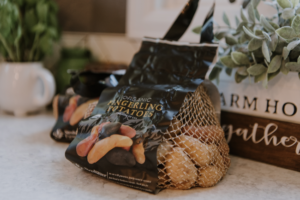
“All the varieties and changing (packing lines) so frequently is a challenge,” she said. “Everybody kind of has their own area of expertise, and I think they really take pride in it.”
Growing a wide variety of conventional and organic potatoes isn’t easy from growing or a shipping standpoint, but Harry said versatility and quality are the established goals and credits everyone on staff for buying in.
“We feel our conventional potatoes are every bit as healthy and good as our organic, but we realize not everyone feels that way,” he said. “We just want to be there to fill that market.”
— For more on Strohauer Farms, check out episode 12 of “The Potato Field” podcast.







